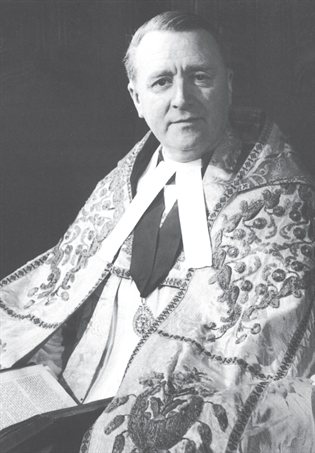The Very Revd Eric Symes Abbott (1906 – 1983)
 The Very Revd Eric Symes Abbott grew up in Nottingham and studied at Jesus College Cambridge. He was ordained as an Anglican priest in 1931.
The Very Revd Eric Symes Abbott grew up in Nottingham and studied at Jesus College Cambridge. He was ordained as an Anglican priest in 1931.
He was Chaplain to King’s College London from 1932 to 1936, and also served as Chaplain to Lincoln’s Inn at the same time. Before returning to King’s as Dean in 1945 he was Warden of Lincoln Theological College for nine years (1936-1945).
Eric Abbott left King’s in 1955 and served as Warden of Keble College Oxford for four years, before being appointed Dean of Westminster in 1959, a post he held until his retirement in 1974. In many ways he exemplified the relationship between Church and State, acting as Chaplain to King George VI from 1948 until the King’s death, and then as Chaplain to Queen Elizabeth II from her succession until his move to Westminster (he was subsequently appointed an Extra Chaplain to Her Majesty on his retirement, a post he then held until his death). He was made a Fellow of King’s College London in 1946, a KCVO in 1966, and a Freeman of the City of Westminster in 1973. His funeral was held in Westminster Abbey, and he is buried in the nave, close to the nave altar and the place from which the lecture is given; the stone which marks his grave carries the epitaph ‘Friend and counsellor of many, he loved the Church of England, striving to make this House of Kings a place of pilgrimage and prayer for all peoples. Pastor Pastorum’.
His particular interest in matters of spirituality and pastoral theology was clear from early in his ministry, when in 1939 six of his addresses on prayer were published (as Escape or Freedom?). Further publications included Foothold of faith (1943), Education in the spiritual life (1961), and The Compassion of God and the Passion of Christ (1963). Generations of Anglican clergy owed much to Eric Abbott’s teaching and example, and following his death there was a strong feeling that there should be a lasting memorial to this influential figure, which should continue to encourage exploration of and reflection on issues which had been close to his heart.